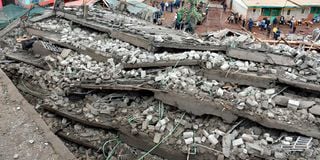When the roofs are wacky and buildings cracked

What remained of a five storey building which collapsed in Ruaka, Kiambu County on November 17, 2022. Two people died from the Thursday morning incident.
What you need to know:
- She lost her husband to another collapse recently. Ouch. I can’t imagine it – you wake up to an empty side of your bed because, in less than 24 hours, the man in whose arms you found comfort for years is no more.
It’s been a month of agony for many, particularly in the capital city Nairobi.
Maybe you might simply not understand the pain in the groin; not literally though, but the one that comes from extreme emotional distress.
You would recall that this was not the first time that some Kenyans experienced the soreness of losing a loved one or witnessing injuries because maybe, just maybe, the state failed to protect people from weak buildings, which had perhaps wacky roofs too dangerous for inhabitants.
“This is where I used to sit with my parents. They have died because of someone’s greed.” I clearly remember the son of a man and his wife who died whilst sleeping safely in their home telling the Nation what actually happened.
The trouble came from a six-storey building adjacent to theirs that caved in and landed on their house at 4am as they slept, perhaps dreaming of beautiful things for the day that was about to begin in Ruaka on November 17, 2022.
Unfortunately, it was their last and they would not even have the opportunity to see the sunrise. The tear duct of Patrick Karomo was full under his lower eyelid and he would fight back that salty liquid from flowing freely as he spoke at the scene.
The look of stones and other construction materials as part of the rubble of the condemned structure on ground zero probably was indicative the building was a bomb to explode in a matter of time. The sadness written on the faces of the neighbours as one walked through the vicinity was enough to arouse anger, a barrage of questions, and just a feeling of where responsibility lies.
You can’t cry over spilled milk. I was taught that as a little girl. So after visiting the site where the last building collapsed on November 21, I decided to go see my neighbour, Elizabeth.
I wanted to check up on her because I was suddenly saddened by the images I had seen and recollected what had happened to her months earlier.
They say our strength is found in encouraging others who find themselves in the same pain we are in. I think it’s true.
She lost her husband to another collapse recently. Ouch. I can’t imagine it – you wake up to an empty side of your bed because, in less than 24 hours, the man in whose arms you found comfort for years is no more.
“I did not sleep, my dear. I couldn’t. I bet you wouldn’t have either,” she said in a muffled voice worsened by floods of tears that ran down her face effortlessly.
What can I say? I thought. In such moments, the least harmless comment could pinch the most. I gave her a faint smile and rubbed the back of her palm. I could not replace her husband but I could be there for her.
I spent over 30 minutes with Elizabeth and left her temporary home with her sisters. But before I could bask in the little relief I had from comforting Elizabeth after I left, my heart was broken again. I saw two little boys in front of the collapsed building that was less than 500 metres away from Elizabeth’s sister’s place.
They were waiting for their uncle to pick them up at their new place of residence. I inquired why they still remained there and was informed he had been delayed because there was heavy traffic on the way following an accident. They had slept in a neighbour’s place since shortly after the disaster hit.
I can go on and on about the difficult stories I encountered along this route.
But my challenge in the midst of this is why this country, Kenya, has had to experience at least four building collapses, injuring many with at least five killed in three months, with three of the collapses happening in just a week.
So Johnson Sakaja, Nairobi’s governor, asked shortly after the building collapsed in the Kasarani suburb that the owner of the building be arrested and charged with murder because the required construction permits had not been issued.
But what happened to the people under and perhaps over him who were supposed to have ensured that the right thing was done before disaster could strike? Yes, they had visited a day earlier, I believe, but when a supposed contractor on site instructed work should continue, was there a follow-up? Maybe it’s complicated.
What happened also to the order from the presidency in 2015 for an audit of all of the country’s buildings after eight structures collapsed and killed 15 people?
Wait, I thought the National Construction Authority also found that 58 percent of the buildings in Nairobi were unfit for habitation. Any progress on what is being done?
As questions rage in my mind, I am only hoping that the families will get well soon and probably do what they can, no matter how technically insignificant they may be, in renting and or purchasing safe buildings.
Did I hear some MP say all die be die in the GMO debate in Kenya? Sorry to have digressed. That’s for another day.
Mais, franchement, c’est quoi le problème de l’Afrique? (But, frankly, what is the problem of Africa?) How do you even say this in Kiswahili? Anyway, asante sana. Whew. I rest my case.
- The writer is a journalist from Accra, Ghana, and is the news editor at Asaase Radio.




